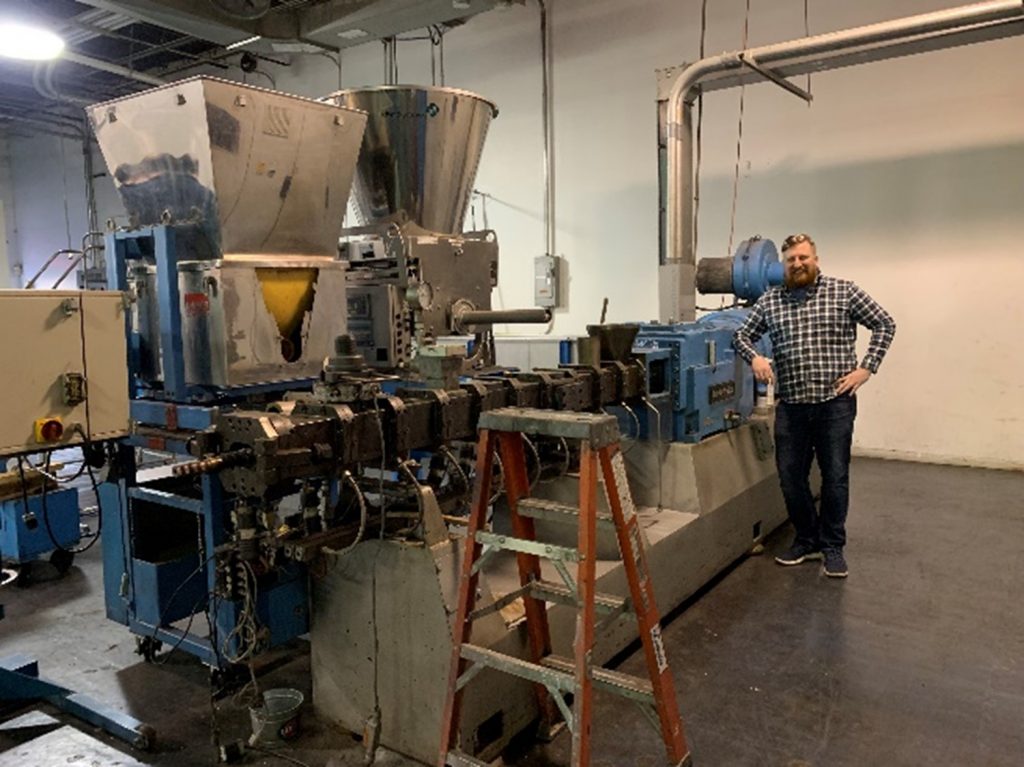This week Jeff Beegle, the Co-Founder and Chief Science Officer of mobius, provides insights on how mobius is approaching the plastics circular economy.
How/why did you start mobius?
Tony Bova and I are the co-founders of mobius. We met eight years ago during undergrad up in Ohio, through extracurricular student groups that were focused on sustainability and renewable energy. In one of these groups, we started a green fund at our university to try to improve sustainability and student involvement on campus.
Through all of that, we went through a business plan competition to try to raise money for one of the projects we were working on. Even though that didn’t actually go anywhere, that was our exposure into entrepreneurship. So after undergrad, Tony and I went to the University of Tennessee – they had a PhD program in energy, science and engineering. The appeal was that it was an interdisciplinary degree where you would work on your technical chops, but also have a focus in entrepreneurship or policy while also getting to work with the national labs.
We both saw that this was an awesome opportunity to go to grad school and be able to start working on the foundation for a startup. We did we did pitch competitions and participated in some local accelerator programs. This led to us getting a local office with lab space in the Knoxville area, and then we started getting grants encouraging us to do research and development.
What is mobius working on?
Mobius is connecting the dots between waste generators and manufacturers who are otherwise taking petroleum based or natural gas-based materials to make consumer products. From a first principles perspective, our approach is that we see a double-sided market when it comes to waste generation and creating chemical and material building blocks. There are many companies that produce large quantities of what we like to call industrial organic waste.
Industrial organic waste is inevitable. For instance, food processing companies will typically produce organic waste (peels, pits, etc). Even though most of the “food value” is extracted, leaving waste behind, there’s still value in the waste from a chemistry perspective. We look at organic waste as a composite of four building blocks: proteins, fats, sugars and lignin.
We evaluate these waste streams when we talk to large companies. Then, on the back end, we are developing and building a portfolio of technologies to convert those building blocks/waste components into chemical and material building blocks, such as polymers, specialty chemicals that are made from waste.
How/why did you start mobius?
Tony Bova and I are the co-founders of mobius. We met eight years ago during undergrad up in Ohio, through extracurricular student groups that were focused on sustainability and renewable energy. In one of these groups, we started a green fund at our university to try to improve sustainability and student involvement on campus.
Through all of that, we went through a business plan competition to try to raise money for one of the projects we were working on. Even though that didn’t actually go anywhere, that was our exposure into entrepreneurship. So after undergrad, Tony and I went to the University of Tennessee – they had a PhD program in energy, science and engineering. The appeal was that it was an interdisciplinary degree where you would work on your technical chops, but also have a focus in entrepreneurship or policy while also getting to work with the national labs.
We both saw that this was an awesome opportunity to go to grad school and be able to start working on the foundation for a startup. We did we did pitch competitions and participated in some local accelerator programs. This led to us getting a local office with lab space in the Knoxville area, and then we started getting grants encouraging us to do research and development.
What is mobius working on?
Mobius is connecting the dots between waste generators and manufacturers who are otherwise taking petroleum based or natural gas-based materials to make consumer products. From a first principles perspective, our approach is that we see a double-sided market when it comes to waste generation and creating chemical and material building blocks. There are many companies that produce large quantities of what we like to call industrial organic waste.
Industrial organic waste is inevitable. For instance, food processing companies will typically produce organic waste (peels, pits, etc). Even though most of the “food value” is extracted, leaving waste behind, there’s still value in the waste from a chemistry perspective. We look at organic waste as a composite of four building blocks: proteins, fats, sugars and lignin.
We evaluate these waste streams when we talk to large companies. Then, on the back end, we are developing and building a portfolio of technologies to convert those building blocks/waste components into chemical and material building blocks, such as polymers, specialty chemicals that are made from waste.

Our first focus is taking lignin, which is the primary waste product of the paper and biofuel industry. We have a proprietary process to convert lignin into biodegradable and compostable polymers.
What is the impact?
We are primarily focused on environmental impact. A lot of food production methods are heavily reliant on plastic. From the beginning of planting, producers are using plastic mulch film (to prevent weeds), propagation trays, and flowerpots that are typically single use, mainly to avoid spreading disease. These plastics are mostly polyethylene, which is not degradable in soil or compost. Farmers will remove the plastic from the field post-harvest, but because it’s contaminated with pesticides and herbicides, it often can’t be recycled. In the worst scenarios the non-degradable plastics are being tilled into the soil, which accumulates micro and nano plastics in the soil, or burned.
mobius is currently creating a biodegradable and compostable material that can replace plastic products used in agriculture. When farmers are done harvesting, our products can be tilled or mixed into the soil and contribute to soil health instead of having to be removed and manually transported to a landfill. Our material naturally degrades in the environment, contributing nitrogen and potentially other nutrients to improve soil health. There is some evidence in literature to suggest that biodegradable mulches can improve microbial activity and soil health in these applications.
What is the current market landscape? How does the ecosystem seek to benefit from your technology?
We’ve taken a fundamentally different approach than other kinds of bioplastic companies – we’re trying more to integrate with existing supply chains and work with existing manufacturers, rather than trying to do that ourselves. We’re building technologies that take lignin and convert it into a new product or a raw material. Other companies are more focused on producing the polymer and the end product.
If we can scale our technology, we can integrate into those manufacturing plants to make a more sustainable plastic. For instance, flowerpot manufacturers that have attempted to make biodegradable plastics in the past have not been commercially viable because the biodegradable polymers they’re using are expensive. Since we’re using lignin, which is a waste stream, that helps reduce the cost of materials.
How are you thinking about policy?
In agriculture there are regulations on who can use biodegradable and compostable plastics. If you are a certified organic grower, the USDA does not allow you to use biodegradable and compostable materials because there’s not enough data on the impacts of biodegradable plastic on crops. Farmers can still use a biodegradable plastics but can’t degrade it in the same place that they’re growing your crops.
This is still a relatively new – studying the end of life in terms of polymers and in the natural environment. Because soil types vary so much by region, it’s hard to make policies that are a blanket policy for all farmland across the US.
We’re also trying to contribute to the development of these standards to inform new policies related to biodegradable and compostable plastics.
What does the future look like?
It’s a really exciting time!
We’re a part of several industry associations that are trying to bring the entire ecosystem together. We regularly interact with brands, retailers, and manufacturers to understand what the market is like.
Again, mobius is looking at companies that are producing organic waste on a large scale are investing in solutions to find more sustainable ways to get rid of their waste, as well as companies looking at their improving their plastic footprint. Both of these trends have been noticeable and will only increase as time goes by.
With our technology, there’s a very clear use case of a circular product, lignin. We can take lignin, a waste stream from paper mills, turn it into a flowerpot, and then paper mills can use that flowerpot to propagate the next generation of their trees. That’s a very clear version of what we think the future can look like.
About The Author

Daniel currently works at Lawrence Livermore National Laboratory. His original assignment was to maintain and update facility safety documentation for all facilities on-site, and perform risk analysis. Over time, his role has expanded to leading continuous improvement efforts through product management.
Concurrently, Daniel volunteers with Techstars, helping organize startup weekends, and with the American Institute of Chemical Engineers, organizing events on the local and national levels of the organization. He also volunteers with One World, and previously with Powerhouse Ventures, to source and screen startups for potential investment.
Daniel holds a BS in Chemical Engineering from UC Davis, and recently completed coursework in energy innovation from Stanford. His passion is at the intersection of sustainability, innovation, and business.

